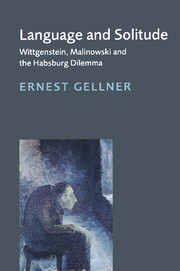Book contents
- Frontmatter
- Contents
- Preface
- Foreword
- Part I The Habsburg dilemma
- Part II Wittgenstein
- Part III Malinowski
- 23 The birth of modern social anthropology
- 24 The Malinowskian revolution
- 25 How did Malinowski get there?
- 26 Whither anthropology? Or: whither Bronislaw?
- 27 The difference between Cracow and Vienna
- 28 Malinowski's achievement and politics
- 29 Malinowski's theory of language
- 30 Malinowski's later mistake
- 31 The (un)originality of Malinowski and Wittgenstein
- Part IV Influences
- Part V Conclusions
- General bibliography
- Bibliographies of Ernest Gellner's writings on Wittgenstein, Malinowski, and nationalism
- Index
27 - The difference between Cracow and Vienna
Published online by Cambridge University Press: 05 March 2010
- Frontmatter
- Contents
- Preface
- Foreword
- Part I The Habsburg dilemma
- Part II Wittgenstein
- Part III Malinowski
- 23 The birth of modern social anthropology
- 24 The Malinowskian revolution
- 25 How did Malinowski get there?
- 26 Whither anthropology? Or: whither Bronislaw?
- 27 The difference between Cracow and Vienna
- 28 Malinowski's achievement and politics
- 29 Malinowski's theory of language
- 30 Malinowski's later mistake
- 31 The (un)originality of Malinowski and Wittgenstein
- Part IV Influences
- Part V Conclusions
- General bibliography
- Bibliographies of Ernest Gellner's writings on Wittgenstein, Malinowski, and nationalism
- Index
Summary
It is relevant here to return to the difference in the way in which the deep pervasive polarity was felt in Vienna and in Cracow. The influx of nationalities into the expanding imperial capital meant that by the end almost everyone went over to a Völkisch-national position. The only liberals, or very nearly, were those of Jewish background or with Jewish links, i.e. the cosmopolitans. They could choose, in their public persona, to be proud of their universalistic liberalism and spurn the ethnic totem poles as shameful atavisms – such is the stance of Popper's Open Society – or they could sardonically indulge their self-hatred and damn themselves for their lack of roots. It hardly mattered: as Arthur Schnitzler remarked about a similar dilemma faced by the same category of people, you could be pushy or shy, but you could not win. So a man might well be driven to want to be a transcendental ego, at the limits of the world but not of it, in order to escape being a Viennese Jew.
In Cracow it was all somewhat different. The overwhelming majority of the intellectuals were Polish, which was a good and prestigious thing to be, and they did not have trouble with their own personal identity. Assimilated Jews amongst the Polish intelligentsia, such as Gumplowicz, were few in number. The Jews from the Städtl did not, on the whole, try to enter the ranks of the Polish gentry, though Sir Lewis Namier's family became landowners and converted. Instead, they made straight for Vienna and entered German rather than Polish culture.
- Type
- Chapter
- Information
- Language and SolitudeWittgenstein, Malinowski and the Habsburg Dilemma, pp. 138 - 139Publisher: Cambridge University PressPrint publication year: 1998

